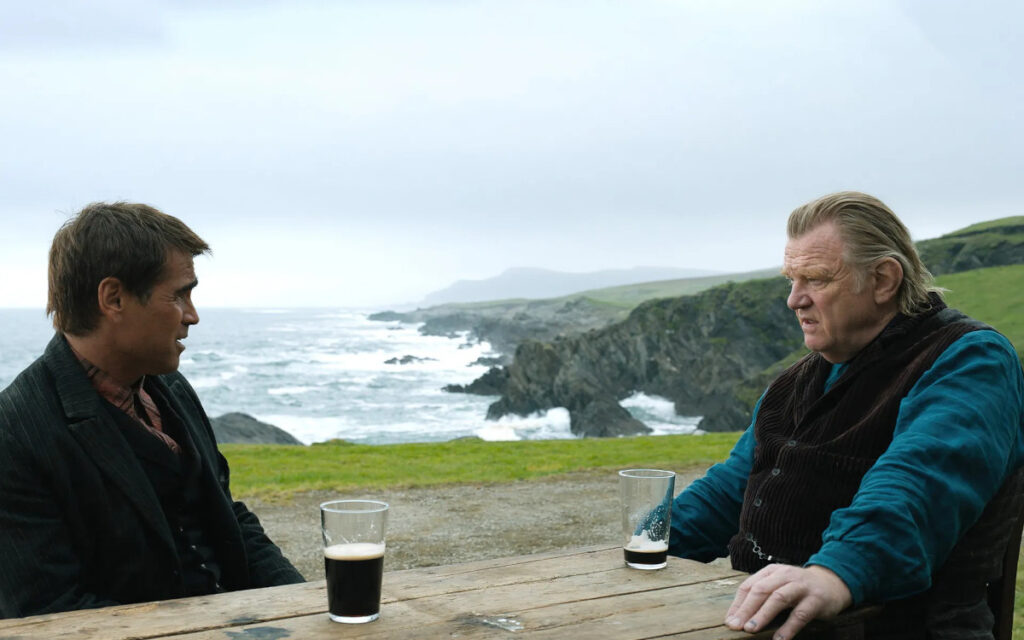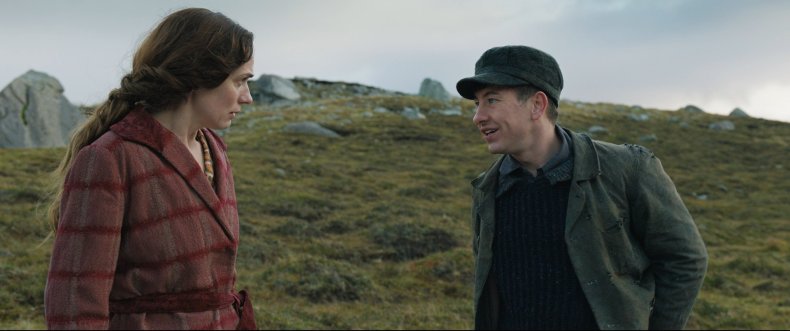
The Banshees of Inisherin is set in 1923 on a fictional Irish island literally detached from the mainland and its Irish Civil War. Pádraic (Colin Farrell), who raises some livestock, and Colm (Brendan Gleeson), a fiddler, are lifelong buddies. There’s not much to do on the island, other than look forward to meeting up at the local pub. So, Pádraic is shocked when Colm announces that he no longer wishes to chat with Pádraic at the pub. Colm is facing his own mortality and reckons that shooting the breeze with Pádraic is taking away valuable focus from composing Irish music, Colm’s only chance at an immortal legacy. Unlike Colm, Pádraic is not a man of ideas, and Pádraic is hurt and baffled.
Colm is polite but very firm and clear about his request to be left alone. But Pádraic desperately needs human connection, and he cannot leave Colm alone. Colm throws down an ultimatum, and Pádraic, to the dismay of the other islanders, blunders right through the stop sign. Actions escalate, and the two men become mired in a contest of absurd stubbornness.
One thing is for sure, I will always remember this movie when I hear a thunk on my window or door (not a knock, but a THUNK).
As serious as are the consequences of the men’s squabble, Irish wit abounds, and The Banshees of Inisherin is a funny movie. It may contain the funniest confession booth scene in the history of cinema.
The Banshees of Inisherin is written and directed by Martin McDonagh, whose Three Billboards Outside Ebbing, Minnesota won two Oscars. Banshees reunites McDonagh, Gleeson and Farrell fourteen years after their In Bruges, a masterpiece of comic neo-noir that I just rewatched last week (to my renewed delight).
This is an acting showcase for the considerable acting talents of Gleeson and Farrell. Gleeson, whose Colm is ever polite but even more resolute, has an amazing body of work: Into the West, Braveheart, The General, Gangs of New York, The Guard, Albert Nobbs, The Grand Seduction, Calvary, The Tragedy of Macbeth and a few Harry Potter movies.
Farrell has demonstrated that seeks out auteur directors; he’s worked with Steven Spielberg (Minority Report), Joel Schumacher (Phone Booth, Valerie Guerin), Yorgos Lanthimos (Lobster, The Killing of a Sacred Deer), Terrence Malick (The New World), Sofia Coppola (The Beguiled) and Kogonada (After Yang). Farrell’s Pádraic takes dim affability to an unmatched level of self-destructive obnoxiousness.

But the best two performances in this exceptionally well-acted film are those by Kerry Condon as Pádraic’s sister Siobhan and by Barry Keoghan as the intellectually challenged young islander Dominic. Condon’s longsuffering Siobhan is bright and spirited – and the only islander with a lick of common sense. The longer the two men’s struggle progresses, the more the movie becomes Siobhan’s as she tries to mitigate their madness and at least protect herself from it. Condon is the youngest actor to play Ophelia for the Royal Shakespeare Company and has amassed a considerable body of work in episodic television: Rome, Ray Donovan, Better Call Saul.
Keoghan is always a splashy actor and he has a lot of fun with the unpredictable and irritating Dominic. His lakeside scene with Condon is heartbreaking.
There’s been plenty of Oscar buzz for Gleeson, Farrell and Keoghan – and there should be for should be for Condon.
Now how good a movie is this? The humor and gripping story kept me wanting to see the pages turned, the acting is magnificent and the cinematography is beautiful. But what is McDonagh trying to say, if anything? Is this some kind of a parable, or just a portrait of two individuals’ stubbornness? I’m really not sure, but it’s a good thing that The Banshees of Inisherin made me care about the answer.

I have been wondering if this would be worth seeing…may give a try